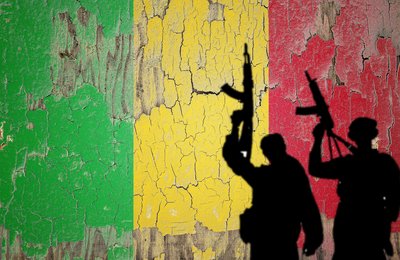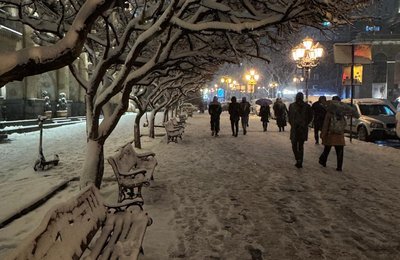Research this month
On Peacemaking: A Decade of Reflections 2006-2015
Oslo Forum Background Papers provide a collage of reflections from our Oslo Forum network, and unique insights into the challenges of peacemaking. They also show the strides we have made since the Oslo Forum’s inception more than a decade ago, as the mediation field becomes more structured but also diversified. At the same time, some of the thorniest issues mediators are faced with when designing peace processes and reaching sustainable settlements persist over the years.
For the past 10 years, the Centre for Humanitarian Dialogue has hosted the annual "Oslo Forum" which brings together leading figures in peacebuilding to share their insights. On Peacemaking is a collection of some of the key background papers written for the forums over the past decade. The papers cover all aspects of peacebuilding, mediation, and conflict resolution.
Techology for evaluation in fragile and conflict-affected states
Evaluators need a broad understanding of how technology can fit into various aspects of an evaluation before starting to think through what might work best for a particular evaluative process.
Techology for evaluation in fragile and conflict-affected states, from Tufts University, is a practical guide to using new technologies to support evaluation in fragile or conflict-affected environments. The document is intended to help people with little prior understanding of new technologies, and provides guidance on what technology is available, where if can be useful, and how it can be introduced.
Women, conflict and public authority in the Congo
The role of women in conflict is another domain where misguided assumptions and misconceptions dominate. Contrary to what is often believed, women’s roles in the Congo’s violent conflicts are not invariably passive. Moreover, their involvement in the exercise of public authority in conflict-affected areas has not always led to peace and stability.
Women, conflict and public authority in the Congo, from the Rift Valley Institute, explores efforts to increase women's participation in governance in DR Congo. The paper argues that there is a tendency to base programmes on gender stereotypes, an assumption that increasing women's participation will automatically have a positive effect on peace and conflict. The paper highlights how this assumption does not always match reality. Increasing participation should instead be based on promoting the inherent rights of women's participation in governance.
Women in armed groups and fighting forces: lessons learned from gender-sensitive DDR programmes
Gender-sensitive DDR programming must be linked into the entire peace process, from the peace negotiations through peacekeeping and subsequent peacebuilding activities. This process should include issues such as identifying women and setting the appropriate criteria for their entering DDR processes.
Women in armed groups and fighting forces, from NOREF, looks at women's participation in DDR programmes. The report makes the case that women have unique experiences of conflict which are not always adequately addressed. The report shares examples from DDR programmes around the world that have come closer to responding to the full range of experiences and needs of women involved with armed groups.
Exploring Peaceful Co-existence in Nairobi’s Urban Settlements
The process provided a safe and alternative space for participants to share their perceptions, experiences, solutions and strategies, while listening to others’ perceptions, thereby contributing to a positive and constructive change in attitudes within and between community groups reached.
Exploring Peaceful Co-existence in Nairobi’s Urban Settlements, from Life and Peace Institute (LPI) and Centre for Christian-Muslim Relations in Eastleigh (CCME), is the result of a joint project of the LPI and Kenyan organisation CCME to understand community perspectives of peace and security in Nairobi. The project was unique in that it served as both a piece of research and, by opening a space for community dialogue, a peacebuilding process.
EurActiv
African Union seeks own solution to South Sudan crisis
The UN is rapidly running out of patience with the president and vice-president of South Sudan, but the Northeast African country’s neighbours have still not imposed any new sanctions on it. Read the full article on EurActiv »
From the blog
The role of local peacebuilding organisations in CAR
 By Ruairi Nolan: A short report on the role of local organisations in peacebuilding and atrocity prevention in CAR. Read more »
By Ruairi Nolan: A short report on the role of local organisations in peacebuilding and atrocity prevention in CAR. Read more »Are the bad times returning to Zimbabwe?
 By Edward Chinhanhu: Between 2008 and 2009, Zimbabwe experienced a devastating social, economic and political crisis. Despite an impressive recovery, when Edward Chinhanhu visited Harare recently he found worrying signs that the old crisis was returning. Read more »
By Edward Chinhanhu: Between 2008 and 2009, Zimbabwe experienced a devastating social, economic and political crisis. Despite an impressive recovery, when Edward Chinhanhu visited Harare recently he found worrying signs that the old crisis was returning. Read more »Three women in three major roles: coincidence or a step towards equality and empowerment?
 By Ambika Pokhrel: Nepal currently has a female President, Speaker of the Parliament and Chief Justice, a big step for a country that has been struggling for equality. Read more »
By Ambika Pokhrel: Nepal currently has a female President, Speaker of the Parliament and Chief Justice, a big step for a country that has been struggling for equality. Read more »Peacebuilding prospects in Abkhazia
 By Tamar Lagurashvili: Whilst the conflict between Georgians and Abkhazians has contributed to icy relations, local organisations on the ground have an important role to play in rebuilding trust, says Tamar Lagurashvili. Read more »
By Tamar Lagurashvili: Whilst the conflict between Georgians and Abkhazians has contributed to icy relations, local organisations on the ground have an important role to play in rebuilding trust, says Tamar Lagurashvili. Read more »Somalia: will its refugee and displacement crises ever be solved?
 By Abdiwahab M. Aliand Badra Yusuf: A combination of human and natural disasters has generated a repeated wave of refugees in Somalia. Abdiwahab M. Ali and Badra Yusuf discuss the difficulties. Read more »
By Abdiwahab M. Aliand Badra Yusuf: A combination of human and natural disasters has generated a repeated wave of refugees in Somalia. Abdiwahab M. Ali and Badra Yusuf discuss the difficulties. Read more »Reconciliation and justice in Kashmir
 By Ashima Kaul: Now that the return of Kashmiri Pandits is on the political cards, complex ideas of identity and reconciliation are coming to the fore. Read more »
By Ashima Kaul: Now that the return of Kashmiri Pandits is on the political cards, complex ideas of identity and reconciliation are coming to the fore. Read more »When celebration turns to blood: South Sudan's fifth anniversary
 By George O'Ngoha: South Sudan's fifth anniversary should have been a time of celebration. Instead it turned into blood and violence on the streets, says George O'Ngoha. Read more »
By George O'Ngoha: South Sudan's fifth anniversary should have been a time of celebration. Instead it turned into blood and violence on the streets, says George O'Ngoha. Read more »Who guards the guardians in Burkina Faso?
 By Boris Somé: Civil society has played a key role in Burkina Faso’s transition to democracy. But independent organisations must stay independent for real change. Read more »
By Boris Somé: Civil society has played a key role in Burkina Faso’s transition to democracy. But independent organisations must stay independent for real change. Read more »Congolese concern: will Kabila stand?
 By Maguy Libebele: DR Congo President Joseph Kabila is yet to declare whether he will stand in this year’s election. The uncertainty is scaring people, says Maguy Libebele. Read more »
By Maguy Libebele: DR Congo President Joseph Kabila is yet to declare whether he will stand in this year’s election. The uncertainty is scaring people, says Maguy Libebele. Read more »




